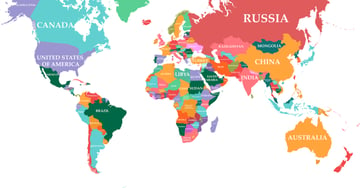 Today’s workforce has more people who have lived, worked, or studied abroad than at any other time. Global living poses a unique challenge to employers during the background screening process. How can you access a background check from another country and review the applicant’s history and still maintain the compliance and integrity of your background screening process?
Today’s workforce has more people who have lived, worked, or studied abroad than at any other time. Global living poses a unique challenge to employers during the background screening process. How can you access a background check from another country and review the applicant’s history and still maintain the compliance and integrity of your background screening process?
Background screening reports are available from a wide variety of foreign countries.
You just have to know how to find the information, and what you need to gain access to it. It’s time to update your background check policy by understanding and executing international background screening.
Here are five tips employers must know before embarking on an international background screening process.
#1: Expect longer turn times
While checking the criminal history, verifying education and employment, and completing reference checks usually take a few days in the United States, it can take much longer in other countries. Issues with privacy laws and rules vary by country, making it more complex to navigate. Some countries offer the same information as the U.S. while others won’t give out any information at all. And, depending on the country, the government may not keep accurate or thorough records, so some information could return as incomplete.
#2: Allow for extra documentation
Foreign countries may require identification and additional documentation in addition to what the U.S requires. With varying privacy laws and information gathering standards, employers may need to have access to more of the applicant’s information and documentation if they want to screen them internationally. It’s a smart practice to have as much information on the candidate as possible on the front end, from their date of birth to the dates he or she resided in the foreign country, to their address, to ensure an accurate international background checks.
#3: Identify country rules in advance
A key mistake we see with employers who order international background checks on applicants who have lived in other countries is they don’t ask questions up front. Requesting information on a particular country, its laws, and the type of information their companies, schools, and courts will and won’t divulge is key to keeping your background screening process moving forward productively. Be sure to talk with your background screening provider before you order an international screen, so you know what to expect. This helps to proactively plan your hiring strategy.
#4: Maintain consistent procedures when possible
Employers understand that a uniform, consistent hiring process protects their company against discrimination claims and negligent hiring lawsuits. When it comes to international screening, don’t give up on screening your applicants in the same manner, even if it takes a little more effort. When possible, it’s a smart best practice to compare the same information on everyone. So, if you are verifying a job seeker’s education within the United States, you should make every effort to verify education if an applicant attended school abroad. While it may not always be possible to receive the same in-depth information that U.S. based schools provide (such as dates of attendance, major, grades, etc.) keep documentation showing that you made a valid effort to compare apples to apples when screening applicants for the same position.
#5: Rely on a trusted third-party background screening provider
In an international environment, working with a professional, experienced background screening company is vital. Companies that don’t have tenured screeners on staff, or take the time to keep up with each country’s privacy laws and information gathering standards can guide employers down the wrong road. They may report information that is inaccurate and may miss important information that you need to make the best decision. HR pros need to ask questions about their background screening company’s practices regarding international screening, from the documents they require, to the level of experience of the people doing the screening, to expected turn-around times and pricing. The company should be able to give you direct, educated answers. If they don’t seem to know the difference between national and international screening or offer broad, vague answers, it may be time to find another screening partner.
Today a greater number of people are spending portions of their lives outside the United States. Getting the whole picture on an applicant is eventually going to require delving into international background screening. By being aware of the differences presented by each individual country, committing to a consistent screening policy, and working with a background screening company that is experienced and adept at international screening procedures, you will proactively adapt to the international climate and continue to hire the right people for your open positions.
Other posts you might be interested in
View All Posts
Around the World in A Day: Screening Your International Job Candidates
Read More
Why HR Should Expect Better Background Screening Practices
Read More
